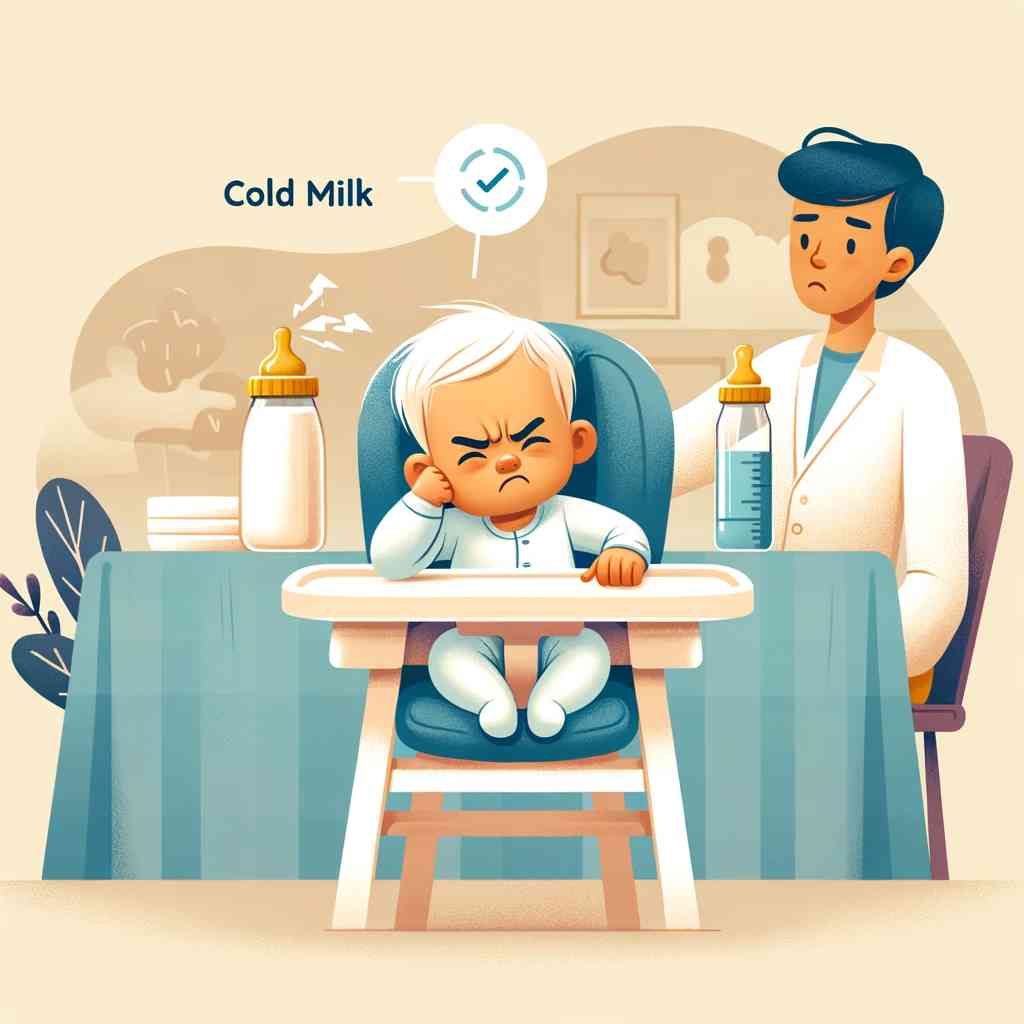Table of Contents
Have you ever fed your child a bottle of milk and then held them in your arms wondering, “Did that just cause my baby to have gas?” Everybody has been there. In order to shed light on this all too frequent query, let’s take a closer look at what’s inside our tiny toddlers’ tummies. It’s going to be an amazing ride, so buckle up, everyone!
Understand Your Baby’s Digestive System And Gas
Our pint-sized peeps sure are complex. For someone so small, their digestive system is surprisingly complex. The instant your baby takes their first milk sip, the digestive process starts. food travels to their stomach, where food is broken down and then forwarded to the intestines for additional processing.
Gas Production In Babies Explained
Moving on to the airier side of digestion: producing gas is absolutely normal – for babies, toddlers and us adults too. So where does this gas come from? A portion of it is simply the air we swallow while eating or crying. The rest results mainly from our food being broken down in the large intestine. Did you know that even certain veggies like broccoli can be gas-forming?
We’re All ‘Lactose Tolerant’ Here
Let’s now discuss lactose, the enigmatic milk sugar that appears to be the subject of every other discussion about infant problems! Lactase is an enzyme secreted by newborns that helps break down lactose and makes it easier for essential nutrients to be delivered for normal growth and development. The problem is that not every baby’s digestive tract breaks down lactose in the same way.
Cold Milk And The Gas Enigma
So, we finally arrive at the million-dollar question: Cold milk. Gas. Is there a connection? Contrary to some popular opinions, cold milk does not necessarily cause more gas in babies than warm or room-temperature milk. It’s a question that befuddles even science to an extent. While some researchers believe colder foods may slow digestion slightly, others contend there’s not enough evidence to definitively say ‘Yes’ or ‘No’.
Warm Milk Vs Cold Milk Digestion
Breaking the myths without breaking a sweat – here it goes. When you’re feeding your baby warm milk, there’s this theory that warm fluids might assist with lipid digestion because of their calming effect on the stomach. However, when it comes to your baby having gas, the temperature of the milk doesn’t seem to play a significant role in this game!
Does Temperature Really Matter?
Alright pandemic parents! Here comes our buzzer-beater question. Does temperature really matter when it comes to giving your little one milk? Confusingly enough, data indicates both yes AND no. While it’s true that our bodies are designed to digest and absorb warm foods more quickly and naturally than cold ones, when it comes to causing gas in babies – there are just too many factors involved to solely blame it on the temperature alone!
Other Factors that Contribute To Gassiness In Babies
We can’t forget about those other pesky factors! Yes indeed, multiple elements beyond just temperature conditions could be causing your nappy-clad tot to fill up with more gas than a helium balloon. Overfeeding, underfeeding, certain food allergies, and even improper feeding techniques can sometimes contribute significantly to this gassy problem. It’s about the whole picture when seeking out the root cause of your baby’s uncomfortable gas.
Myths About Feeding Babies
As with anything related to babies, the myths are as abundant as the diapers. One quite popular one is that milk must always be warmed – but hang on, wasn’t our discussion earlier sticking a big question mark on that one? Sure was! In reality, it’s A-Okay for babies to have room-temperature milk and guess what, it won’t necessarily turn them into gassy little puffballs!
The ‘Cold Foods Are Harmful’ Myth
Let’s not forget the other side of this temperature debacle – the belief that cold foods are harmful to little ones. Hear me out folks – it’s absolutely fine to offer your child chilled food! Provided of course it’s safe and appropriate for their age and stage of development. So don’t fear on those warm summer days when all hope lies in a cool puree or chilled drink!
Tips To Avoid Gas-Related Issues
Alright mommies and daddies, let’s move on to some handy-dandy tips to help keep gas at bay for your little ones. As we discussed earlier, feeding techniques play a crucial role in this context. Ensure your baby is positioned upright while eating, consider paced-bottle feeding, and allow your baby to take pauses during feeds. It sounds minimal but these tricks might just do wonders.
Navigating Foods For Various Age Stages
Moving towards solids? Make sure to introduce new foods slowly and watch how your baby reacts – allergic reactions could be causing those frowny faces and rumbling tummies. And remember – your baby’s tummy is still growing. It’s important to feed food appropriate for their age and digestive maturity. No need to rush folks, let them enjoy the ride!
Expert Advice From Pediatricians
We’ve finally reached the white coat section! Pediatricians have all sorts of guidance when it comes to feeding babies. For starters, they promote breastfeeding mothers to maintain balanced nutrition and avoid certain gas-triggering foods. They also emphasize pediatrician-approved formulas for those opting for bottle-feeding. But remember, every baby is different – get comfortable relying on expert advice tailored to your little one!
Pediatrician Recommended Practices
Get ready for some scrumptious doctor’s orders! Have you heard about ‘bicycle legs’ or ‘belly massage’? Sounds fascinating, doesn’t it? They strongly encourage such belly exercises and massages to help ease any residual tension kept by those troublesome gas bubbles!
Your Frequently Asked Questions
We would be remiss if we didn’t take a gander at some classic FAQs – and no question is too silly when it comes to taking care of our favorite mini-humans. Questions like: ‘Are certain babies more sensitive to cold milk?’ and ‘What causes colic in babies?’ are all part of this vast universe of parenting wonderment.
A Deeper Look At Colic In Babies
The term colic takes us into a whole new realm. It’s that elusive condition every parent dreads – your baby crying nonstop for hours, turning red, and you having no idea why. Pediatricians theorize that it might be linked to indigestion or gas. But worry not, as challenging as it can be to deal with a colicky baby, remember this phase is temporary and should settle by about 3-4 months of age.
Is Room Temperature Milk Okay?
This one’s a popular question: ‘Is room temperature milk okay for my baby’? Believe it or not – the answer is a resounding yes! Comforting isn’t it? Unless your baby has specific digestion issues or given other medical advice, feel free to give them a bottle of room temperature milk and while you’re at it, tick off ‘warming milk’ from your to-do list!
Are Some Babies More Sensitive To Cold Milk?
Moving on to another jittery parental question – ‘Can some babies be more sensitive to cold milk?’ The answer lies in understanding your baby. Each little tot is unique, so what worked for baby Jack may not work well for baby Jill. Although not predominant, some babies may display sensitivity towards colder foods while others digest them effortlessly. Always remember: Baby knows best.
Seeking Child Healthcare Professionals’ Support
If you notice an unusual level of discomfort or irregular digestion issues in your baby – don’t hesitate to reach out to a pediatrician. Healthcare professionals can provide reassurance or possibly identify any underlying conditions that may cause persistent gas, and can ensure you’re not blaming it all on that chilled milk!
Can Expired Baby Oil Cause Gas in Babies?
Yes, expired baby oil can cause gas in babies. Using baby oil after the expiration date can lead to the growth of bacteria, which may result in digestive discomfort for the baby. It’s important to check the baby oil expiration date and discard it if it’s expired to avoid any potential issues.
Exploring Online Parenting Community Discussions
In this digital age, never underestimate the power of an online parent group. It’s like having a mini expert-panel at your fingertips! You’ll find folks sharing their experiences, providing support, and some may make left-field recommendations that happen to work wonders! Sharing is caring in these communities so don’t shy away.
Conclusion
Phew! We’ve covered a lot, haven’t we? From understanding the baby digestion blueprint to crushing myths about cold milk, we made it! Remember parents, when it comes to your bundle of joy, there’s no such thing as ‘one-size-fits-all’. Be it gas issues or any other concern – trust their cues, respect what works for them and above all – continue loving the journey filled with burps and bubbles!

